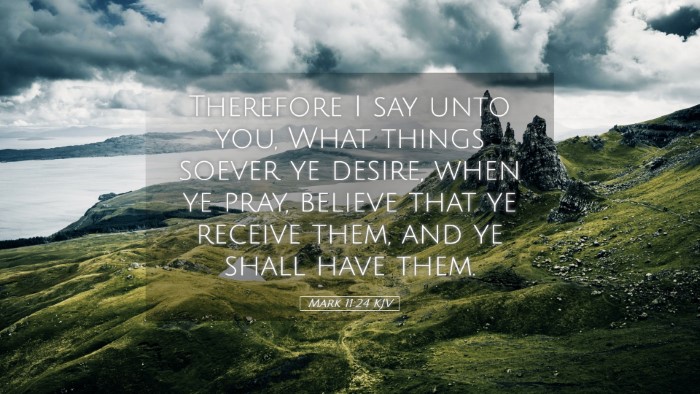Commentary on Mark 11:24
Mark 11:24 states, "Therefore I say unto you, What things soever ye desire, when ye pray, believe that ye receive them, and ye shall have them." This verse is a profound declaration regarding the power of faith in prayer, revealing insights that are crucial for understanding the nature of belief, desire, and divine response.
Understanding the Context
Before delving into the particular verse, it is essential to examine its context within the Gospel of Mark. This passage follows the incident of Jesus cursing the fig tree, which serves as a metaphor for Israel’s spiritual barrenness. His actions demonstrate both judgment and the potential for regeneration through faith. In the broader narrative, Jesus emphasizes the significance of faith as a means to access the power of God.
The Dynamics of Prayer and Faith
This verse underscores a critical principle in the life of a believer: the relationship between prayer and faith. Albert Barnes provides clarity regarding the word "desire," indicating it extends beyond mere wants to align with God's will. Echoing the sentiment, Matthew Henry enumerates the conditions of prayer, highlighting the necessity for sincerity, fervor, and alignment with divine purposes.
Believing Before Receiving
- Faith as the Foundation: Henry explains that belief must precede receiving. It is not the outward expression of words but the inward conviction that prompts God to act. Faith involves a trust that is actively engaged in the request.
- The Assurance of God's Response: Adam Clarke elaborates on the phrase “believe that ye receive them,” pointing towards the certainty in the believer's heart that their prayers have already been answered, which reflects a mature understanding of God's promises.
The Role of Desire in Prayer
When Jesus speaks of “what things soever ye desire,” it invites believers to approach God with their genuine wishes and aspirations. However, this should not be misconstrued as a blank check for selfish or frivolous requests. Instead, it is framed within the confines of a sincere heart seeking alignment with God's character and His Kingdom.
Aligning Desires with God’s Will
- The Need for Discernment: Clarke warns that desires must be evaluated against the teachings of Scripture. Believers are encouraged to pursue spiritual growth and understand what it means to have desires that reflect God's will.
- Desires Rooted in Love: It is essential that desires align with the command to love God and neighbor, as highlighted in numerous scriptural passages. True desires should emanate from a heart transformed by love.
The Certainty of Fulfillment
The reassurance that “ye shall have them” encapsulates the promise of divine provision. Barnes emphasizes that while believers may not always see immediate results, the time factor does not negate the faithfulness of God. This promise calls for patience and perseverance in prayer.
Trusting in God's Timing
- God's Sovereignty in Answering Prayers: Matthew Henry points out that the answers may come in various forms: yes, no, or wait. The believer must trust in God’s sovereign wisdom in the timing and nature of His responses.
- A Test of Faith: The act of waiting can itself be a trial of faith, as the believer grapples with the tension of hope and delay. This delay often serves a greater purpose in God's plan.
Practical Applications for Believers
This verse has significant implications for the practice of prayer in the life of the Church. Here are several practical applications:
- Encouraging a Robust Prayer Life: Pastors and church leaders are called to foster an environment of prayer where belief in God's ability to answer is central.
- Teaching the Nature of God: Through sermons and teachings, it’s vital to communicate God’s desire to engage in a relationship with His people, framing prayer as dialogue rather than a monologue of needs.
- Sharing Testimonies: Highlighting stories of answered prayer within the community can bolster faith and encourage collective belief.
Theological Reflections
Theologically, this passage offers rich material for reflection on the nature of faith, the character of God, and the transformative power of prayer. It propels believers towards a deeper exploration of how they perceive and practice their faith in a world rife with challenges.
Faith in Action
- The Connection Between Faith and Works: James 2:17 teaches that faith without works is dead. Thus, true belief is evidenced by actions that reflect one’s prayer life.
- Prayer as Spiritual Warfare: Understanding prayer as a means to engage in spiritual battles. Believers must be equipped to use prayer to connect with God and access His power in their lives.
Conclusion
Mark 11:24, with its rich tapestry of themes surrounding prayer, faith, and divine assurance, continues to challenge and encourage believers today. The teachings from helpful public domain commentaries such as those by Henry, Barnes, and Clarke enrich our understanding and application of this powerful verse. It implores us to not only pray but to do so with a faith that expects God to act. Through embracing its message, we can cultivate a vibrant faith that profoundly impacts our lives and the lives of those around us.


